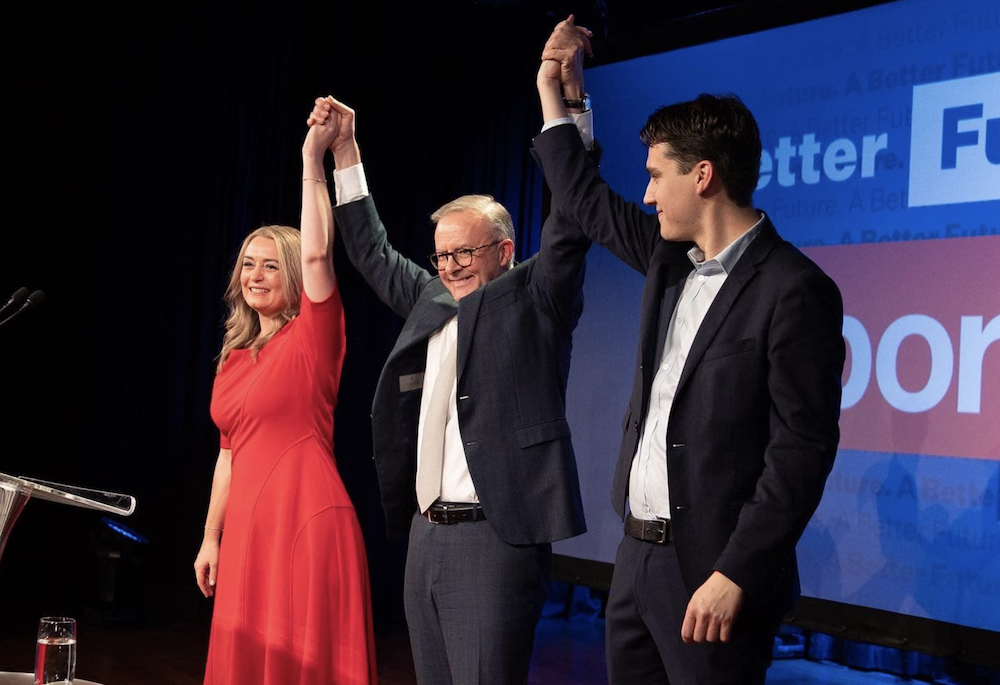Music Industry Reacts to Labor’s Win in the Federal Election

The music industry was quick to welcome the return of Labor to power after the Federal Election on Saturday, and the party’s promise to deliver Australia’s first cultural policy in over a decade.
“Australia needs a vibrant arts and entertainment industry, not just to support other industries and contribute to our economic recovery, but to drive social interaction and wellbeing in our communities – at a time when it’s never been needed more,” stated Live Performance Australia.
Annabelle Herd, CEO of the Australian Recording Industry Association and Phonographic Performance Company of Australia called for the new regime to forge closer ties with the music industry, acknowledge the real social and economic value of music and give it the same level of support that film, television and sport get.
“We are not asking for any handouts,” Herd said.
“We are asking for the new government to work with the industry to create a stronger future for music, our artists, and all creative industries.”
She reminded Anthony Albanese of the 3-point plan announced by 16 associations this month.
The plan included direct investment in the creation of new Australian music, skills development and global exports, incentivising the use of local content on streaming and broadcast platforms, insurance to provide certainty for local audiences, and programs to build industry sustainability through strong intellectual property and national mentorship programs.
In many ways, Labor’s policies are aligned to the biz’s long term vision of exports exceeding domestic consumption, the live sector reaching its waiting boom, and post-pandemic equality of life for musicians and workers with a living wage.
But the trick is to look at what’s on the table and suss out what is filed under “converse and consult” and what’s filed under “action this day”.
APRA AMCOS’ CEO, Dean Ormston, has also welcomed the election of an Albanese Labor Government and looks forward to pursuing a partnership approach to develop the next chapter of success for the Australian music industry.
“We congratulate the incoming Albanese Labor Government and we look forward to working with them on a whole-of-government approach to support the development and growth of Australian music both at home and around the world,” he said.
“An investment approach developed in partnership with the music industry will see dividends in cultural development, employment opportunities and will enhance the social fabric of the nation.
“It will also pay dividends for industries that rely heavily on music, whether it be hospitality, the visitor and night-time economy, tourism and regional development,” Ormston added.
He also thanked the Morrison Government, and outgoing arts minister Paul Fletcher.
Labor’s policy was outlined last Monday (May 16) at the Espy in Melbourne by the then-shadow minister for the arts, Tony Burke.
After the last nine years of a “reign of neglect and sabotage” of the arts, Burke promised a renewed importance of the arts.
“Anyone who understands the sector knows arts isn’t simply about entertainment, leisure and hobbies,” he said. “At its best, it affects our education policy, our health policy, our trade, our relations around the world, our industrial relations approach and is a driver of economic growth.”
These are among Labor’s promises:
+ A national insurance scheme for live events.
+ Commission the ABC to “undertake a feasibility study into the expansion of Double J on radio as the next logical next step in helping great Aussie artists reach more ears.”
+ Promote Aussie content on streaming platforms: “We will work with all stakeholders to determine ways Australian content can be boosted for both Australian music and screen content on streaming platforms.”
+ Work on a national solution to protect consumers and the industry from ticket scalping, rather than piecemeal state-by-state legislation.
+ Put First Nations art and culture “at the centre of our approach” to the sector: “There can be no cultural policy without a specific focus on First Nations art and culture.”
+ Restore ‘arts’ as part of a named government department, to denote its high priority: “Revive cooperation between federal, state and local government to ensure we have a national approach to arts and culture.”
In achieving these, Labor would get support from the Greens.
Its music manifesto includes a national live events insurance scheme, a legislated $250 minimum live performance fee for taxpayer-funded events, additional COVID-19 recovery funding, and a new $1 billion Live Performance Fund to stimulate the live sector.
Its Artists Wage program will see 10,000 “established or emerging artists and arts workers” paid $772.60 per week for one year.
A number of music and arts supporting independent candidates also took power.
Dr Sophie Scamps who grabbed Mackellar (NSW) from the Liberals, will promote First Nations culture and arts education, a national strategy for arts and culture, protecting public broadcasters, and increase employment through a national arts and creative industries strategy.
Allegra Spender who won Wentworth (Sydney) ran on a platform to support creative industries, increase funding to the Australia Council, the ABC and SBS, and rebuild arts education.
Jo Dyer fell short in Boothby (SA) but announced she will work closely with winning Labor challenger Louise Miller-Frost.
An arts worker for 20 years, Dyer champions a National Cultural Policy, a universal basic income scheme for artists, more money for the Australian Council to allow multi-year funding for 200 companies in the small to medium sector from the current 95, more arts education, and a 20% content quota for local streaming services.






























